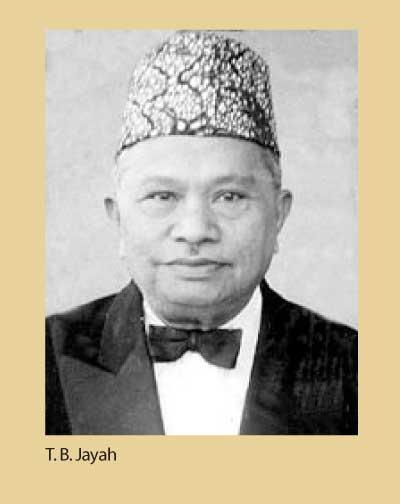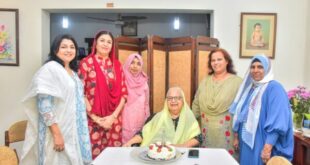 For the minority SL Malays the Independence day celebration would be meaningless if the great Malay National hero DR. T. B. JAYAH is not remembered. His unswerving, unbiased stand to keep the people of Ceylon undivided under the British whose primary motive was to divide and rule is an achievement to celebrate.
For the minority SL Malays the Independence day celebration would be meaningless if the great Malay National hero DR. T. B. JAYAH is not remembered. His unswerving, unbiased stand to keep the people of Ceylon undivided under the British whose primary motive was to divide and rule is an achievement to celebrate.
As a State Councillor, in 1944 he spoke for three hours on the Soulbury Report and the White Paper of the United Kingdom Government to pave the way for full independence. It was on this historic occasion that the then Leader of the House in the State Council, S.W.R.D.Bandranaike paid him a high tribute, when he said: “Credit for the attainment of independence should undoubtedly go to T. B. Jayah for his historic speech in passing the Dominion Bill”.
At a time when that government was vacillating over the issue on the grounds that rights of the minorities should be safeguarded in any future arrangement, Dr.T.B.Jayah making a historic speech during the debate, pointed out that the Muslims were more concerned about the freedom of the country, their motherland, than communal interests. This speech has been acknowledged by all, as one of the factors that contributed to the granting of independence to Ceylon at that point of time.
This Dominion speech by a member belonging to a minority community presently less than 50K strong is too special for the Malays to be proud about. When this community for two decades has been deprived of a rightful nominated seat in the legislature one is compelled to ask the powers that be as to why the Malays are conveniently ignored.
Through courageous efforts by men like TBJ in ensuring the last European invaders off using peaceful means of the gift of the gab, parliamentary politics has grown to higher levels and become an enviable model in a matured democratic set up in our island home. Democracy has withstood the test of time having to face internal strife, insurrections, repeated ethnic unrest, separatism and civil war. Here too the Malays have always been loyal to the state, played pivotal roles in the security services by paying with life and limbs to protect the territorial integrity of our resplendent Isle.
Tuan Branudeen Jayah a true Melayu was born on January 1, 1890 in Galagedera. He died on May 31, 1960 in Medina and was burried at Jennathul Baqi – the ultimate resting place of many Companions and members of the family of our Holy Prophet Muhammed sal. His father, Cassim Jayah was a Police Sergeant. His mother was Nona Maimoona Jayah (nee Sourjah).
A product of St. Thomas’ College, he excelled in his studies and carried away many prizes. He was the sole Muslim among the brilliant young men of other communities who obtained his Bachelor of Arts degree of the London University in 1911.Teaching was dearest to his heart and became his profession for the next 35 years. He taught Classics and History at Ananda College and was also a teacher at Prince of Wales, Moratuwa and Dharmaraja College, Kandy.
In 1921, aged 31 years, the Manager of the Maradana Mosque Committee, N. H. M. Abdul Cader invited him to assume duties as the Principal of Zahira College, Maradana. During his stewardship at Zahira College (1921 – 1948) he transformed it from a tottering elementary school to a premier educational institution. From 6 teachers, 59 boys, hardly any furniture and a small building he handed over the reins to A. M. A. Azeez with 10 institutions, over 3500 students and around 150 teachers. At the time of his retirement in 1948, his devoted service and hard work left Zahira with full coffers and an assured income. He even introduced sports where the Zahirians excelled in Rugger, Soccer and Boxing.
After WW2 , the military occupied the College premises and had to be closed for two years. Since the students needed to continue their education uninterrupted, Jayah opened up branches in Matale, Puttalam Gampola, Alutgama and Slave Island which schools after being established were given independent status. Zahira College Slave Island was named T.B. Jayah Maha Vidyalaya in his honour.
T. B. Jayah’s thought Muslims were an integral part of the multi-racial Ceylonese (Sri Lankan) nation. Jayah’s first and original concern was the education of the Muslims, long neglected due to “Muslim conservatism”. If not for Jayah, Muslims would have remained stigmatized as backward.
Jayah was an Educationist, State Councillor, Member of Parliament, Minister of State and Ambassador to Pakistan, where the University of Punjab conferred on him the Degree of Doctor of Literature (D.Litt. – Honoris Causa).
When Ceylon gained independence in 1948, he was appointed a Cabinet Minister of the D.S. Senanayake Government, the first Muslim to hold that much-coveted position.
Whilst serving as the Ambassador of Ceylon in Pakistan he worked assiduously to set up a Pilgrims’ Rest in Mecca for Ceylonese pilgrims performing Haj. It was in one of his visits to the Holy City to work out this facility that he died in the Holy City of Medina.
Let us salute this great personality on the 76th Independence Day.
May Almighty Allah accept Marhoom Al Haj. T. B Jayah.
Post Disclaimer | Support Us
Support Us
The sailanmuslim.com web site entirely supported by individual donors and well wishers. If you regularly visit this site and wish to show your appreciation, or if you wish to see further development of sailanmuslim.com, please donate us
IMPORTANT : All content hosted on sailanmuslim.com is solely for non-commercial purposes and with the permission of original copyright holders. Any other use of the hosted content, such as for financial gain, requires express approval from the copyright owners.
 Sri lanka Muslims Web Portal Sri Lanka Muslims News Center
Sri lanka Muslims Web Portal Sri Lanka Muslims News Center
 Donate
Donate


